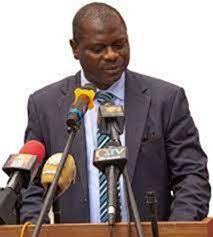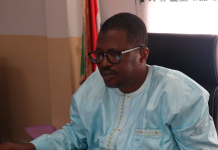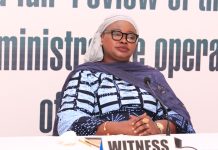By: Kebba AF Touray
Gambia’s Finance Minister Mr. Seedy Keita, has told Members of the National Assembly that Five Hundred Million Dalasi (D500 Million) has been budgeted as subsidy to support farmers with organic fertilizer and seed. Mr. Keita said this during the 2024 budget speech he delivered before Members of the National Assembly on Friday 8th December 2023, and indicated that to support these developments, the 2024 Budget allocation for agriculture saw an increase of 17 percent. He said the reason for this is because of the Gambia’s dependence on food imports which he said has amplified the impact on the prices of basic commodities, further exacerbating the continuous rise in fuel prices, which has subsequently led to elevated transportation costs. He said the National Agricultural Research Institute (NARI) and the Food and Agriculture Organization (FAO) have achieved significant milestones in agricultural research, and this includes the final screening and availability of five groundnut varieties, five new ‘findi’ varieties and three cassava varieties to benefit local farmers. NARI, he said, has also pioneered the development of innovative technologies for livestock feed and soil fertility enhancement, leveraging indigenous multi-purpose shrubs and tree species. He reiterated that to support these developments, the 2024 budget allocation for agriculture has been increased by 17 percent, with about D500 million budgeted as input subsidy, including support for organic fertilizer and seed for farmers.That in addition to Government’s budgetary contribution to the sector, project loans and grants directed to the agriculture sector exceeds D2 billion for 2024.
On donor funding, he said this continues to be relevant in supplementing government’s effort to transform the agriculture sector. He said the Ministry of Agriculture is expected to receive D661.4 million from the Africa Development Bank for the implementation of Resilience Building Against Food and Nutrition Insecurity Project; The Gambia Agriculture and Food Security Project; The Gambia Incentive-Based Risk Sharing System for Agricultural Lending Project (GAMIRSAL), and The Africa Emergency Facility Project Fund.
“The Ministry will also receive D231 million from the World Bank group for the Gambia Inclusive Agriculture Value Chain Project (GIRAV) and another D686.75 million for the Small Ruminants; Rice Value Chain and Regional Soil Mapping Projects,” he said. He informed lawmakers that IFAD is expected to provide the Ministry of Agriculture with D140 million for the Roots project, and disclosed that in the 2023 fiscal year, the sector witnessed substantial growth in the scale and number of agricultural projects, and underscored Government’s unequivocal commitment to and for the prioritization of the sector.
According to Keita, the Ministry of Agriculture (MOA) has made commendable progress toward its objectives and continues to engage in partnerships in order to implement initiatives aligned with the Recovery Focus National Development Plan, to further advance the sector’s transformation. He said the Ministry of Agriculture has introduced a comprehensive postCOVID-19 Emergency Response Plan, by focusing on bolstering the resilience of farmers through the National Agricultural Extension Policy, which he said is designed to foster sustainable production; enhance capacity; improve governance, and facilitate partnership establishment.
Furthermore, Minister Keita said the recent introduction of a Cooperative Policy reflects the Ministry’s dedication to foster a nationwide approach to cooperatives while upholding the principles and values that underpin these entities, particularly their autonomy.
“The policy outlines essential legal and regulatory measures to facilitate its effective implementation,” he said. That within the country, the Ministry of Agriculture channels its efforts towards prioritizing the rice value chain and small ruminant improvement projects, and the development of a national strategy to combat and eradicate ruminant pests (PPR).
“Notably, the prevalent livestock diseases in the country including PPR, Contagious Bovine Pleurae Pneumonia (CBPP) and New Castle Disease (NCD) of poultry, are being addressed through extensive vaccination campaigns for small ruminants and poultry,’’ he said and that during the current year, a significant total of 208,231 small ruminants have received the required vaccinations. The Minister reported that in addition to these efforts, the ROOTS project has played a pivotal role by offering crucial services such as ploughing assistance for 80 hectares of land; the distribution of 160 bags of Urea each weighing 50kg, and the provision of farm inputs including 2,800 sachets of herbicides and 5,300 kilograms of seed through the Rural Poor Stimulus Facility (RPSF) 2 program.
The Small Ruminant Enhancement Project (SREP) he said, is dedicated to the development of community pasture fields and individual farms, and said to date, this project has successfully established 20 community pasture schemes and facilitated the development of 150 individual one-hectare farms, covering a total of 150 hectares.
“While food availability in the market remains generally robust across the country, there has been a notable increase in the prices of cereal crops in 2023, compared to the preceding year. This price surge is primarily attributed to global inflation and the ongoing conflict in Ukraine,” the Minister said.





















